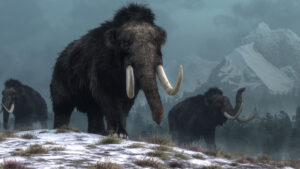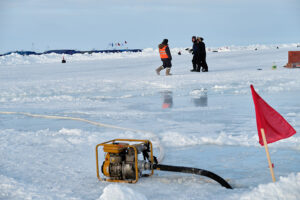After an expedition to Siberia’s Wrangel Island, I took a boat to the mainland village of Inchoun, and from there I expected to fly to the town of Anadyr and then home. But when I arrived, I was told that the plane had some unspecified mechanical problem. Would I be stuck in these parts for hours, perhaps even days? I wondered.
I wandered around Inchoun, which means “Cut Off Nose Tip” in Chukchi. This name is derived from profile of an adjacent cliff, which seems to have part of its edge cut off. The village’s small schoolhouse was modeled after a seal or walrus hunter’s overturned boat.
Speaking of walrus hunters, I encountered one at the village dock. He was a robust fellow and, in fact, his name Omryn actually means “robust fellow” in Chukchi. We started talking in a mixture of pidgin Russian and pidgin English. I said I was an American. “Don’t be insulted,” he told me, “but I like walruses much more than I like Americans.” I told him that I did too.
Just above the dock, an ancient-looking woman was sitting on a bench and doing some knitting. Suddenly a drunk teenager staggered over to her and began yelling in Chukchi. Whatever he said, it seemed to upset the old lady.
“Pridurok!” Omryn hissed. Which means “asshole” in Russian. He told me that the boy was asking the old woman how many centuries it’d been since she’d slept with a man. He also told her that she looked like she was dead, but if she was still alive, could she give him some rubles for a bottle of vodka?
After saying pridurok again, Omryn told me the following story:
Once upon a time, a young Chukchi man was making fun of an old woman. He said he would prefer sleeping with one of his reindeer to sleeping with her. At least the reindeer still had some flesh on its body. As it happened, the old woman was a shaman, and these insults made her quite angry. She began chanting, all the while gazing angrily at the man.
Omryn interrupted his story as two ATVs roared past us. Then he continued. As the old woman was chanting, the man’s penis burst through his trousers, then began growing larger and still larger. The fellow ran down to his canoe, climbed into it, and began paddling away. But his penis had become so large by now that it caused the canoe to capsize, and the man drowned.
“When I was a young boy, I heard that story from my grandfather,” Omryn observed. “He told it to me as a warning not to make fun of elders.”
I looked over at the drunken teenager, who was still harassing the old woman. “The boy’s penis doesn’t seem to be getting any larger,” I said.
“Not yet,” my companion replied.
At this point, one of my plane’s flight crew came down to the dock and told me that the mechanical problem had been solved, so I should immediately head over to the runway. Before I left, I shook Omryn’s hand and thanked him for his storytelling. Or perhaps his truth-telling.






